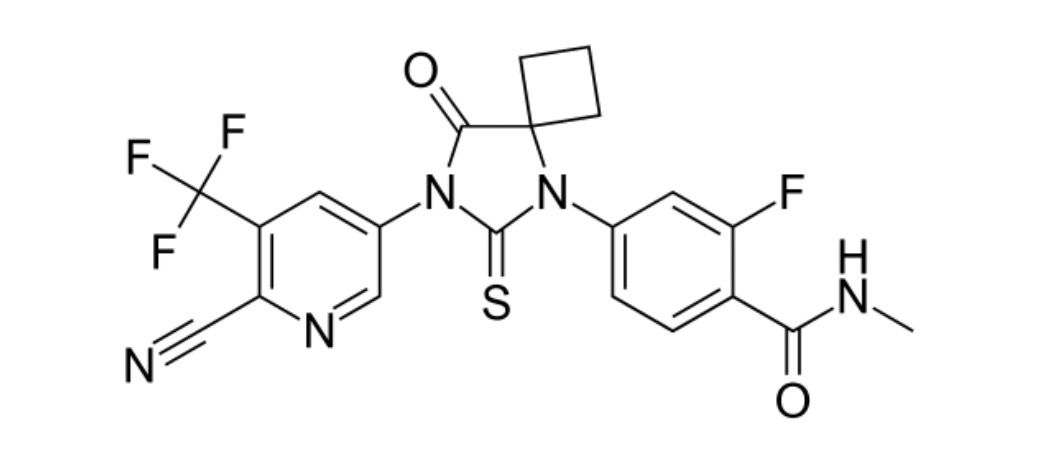Apalutamide

Overview
Apalutamide is a non-steroidal antiandrogen that inhibits androgen receptor signaling, which is critical for prostate cancer cell growth. By blocking the receptor, it slows the progression of prostate cancer, particularly in non-metastatic castration-resistant and metastatic castration-sensitive cases. Administered orally, Apalutamide has demonstrated improved metastasis-free survival and overall survival in clinical trials. It is used in combination with androgen deprivation therapy to provide optimal control of disease progression. The drug is generally well tolerated, with a manageable safety profile, making it a standard of care for advanced prostate cancer patients who require targeted therapy.
Background and Date of Approval
Apalutamide was developed by Janssen Pharmaceuticals as a next-generation androgen receptor inhibitor. It received U.S. FDA approval in 2018 for non-metastatic castration-resistant prostate cancer based on the pivotal SPARTAN trial, which showed significant delay in metastasis compared to placebo. Later, FDA approval expanded to include metastatic castration-sensitive prostate cancer following results from the TITAN trial demonstrating improved overall survival and progression-free survival. Apalutamide is also approved in several other countries, with regulatory authorities recognizing its efficacy in reducing disease progression and its tolerable safety profile. Its approval represents a major advancement in the management of advanced prostate cancer.
Uses
Apalutamide is indicated for the treatment of non-metastatic castration-resistant prostate cancer in combination with androgen deprivation therapy. It is also approved for metastatic castration-sensitive prostate cancer, where it is used to delay disease progression and improve survival. The drug has been evaluated in clinical trials for both monotherapy and combination therapy, with evidence supporting its use alongside standard androgen deprivation therapy. Apalutamide effectively reduces tumor growth and the risk of metastasis, providing a targeted treatment option for patients with advanced prostate cancer.
Administration
Apalutamide is administered orally at a dose of 240 mg once daily, with or without food. Dose adjustments may be necessary for patients with severe hepatic or renal impairment. Monitoring of liver function tests, blood pressure, and other relevant clinical parameters is recommended. Patients should be instructed to swallow tablets whole and not to alter the dosing schedule. Concomitant use with strong CYP3A4 inducers or inhibitors requires caution to avoid altered drug exposure. Regular follow-up and imaging are used to assess disease progression and response to therapy.
Side Effects
The most common side effects of Apalutamide include fatigue, rash, hot flashes, nausea, diarrhea, and weight loss. Mild joint pain, arthralgia, and falls have also been reported. Most adverse effects are mild to moderate and can be managed symptomatically. Patients should be counseled on recognizing side effects and reporting persistent or severe symptoms promptly.
Warnings
Serious adverse events include seizures, severe rash, hypothyroidism, cardiovascular events, and fractures. Patients with a history of seizures or predisposing conditions should be monitored closely. Apalutamide may increase the risk of falls, fractures, and cardiovascular events, necessitating regular evaluation. The drug is contraindicated in patients with known hypersensitivity to Apalutamide or its excipients. Clinicians should weigh the benefits and risks before initiating therapy in patients with significant comorbidities.
Precautions
Before starting Apalutamide, liver and kidney function should be evaluated. Caution is advised in patients with a history of cardiovascular disease or seizures. Apalutamide is a strong inducer of CYP3A4 and CYP2C19, which may reduce the efficacy of certain concomitant medications. Drug interactions should be reviewed carefully, and dose adjustments made as necessary. Patients should avoid concomitant use of strong CYP3A4 inhibitors or inducers without consulting their healthcare provider.
Expert Tips
Ensure patient adherence to daily dosing and provide guidance on managing common adverse effects. Regular monitoring of liver function, blood pressure, and thyroid function is recommended. Educate patients about fall prevention, skin care for rashes, and the importance of timely reporting of severe side effects. Pharmacists should counsel on storage, administration, and potential drug interactions. Collaboration with oncology specialists ensures optimal therapeutic outcomes and patient safety.
